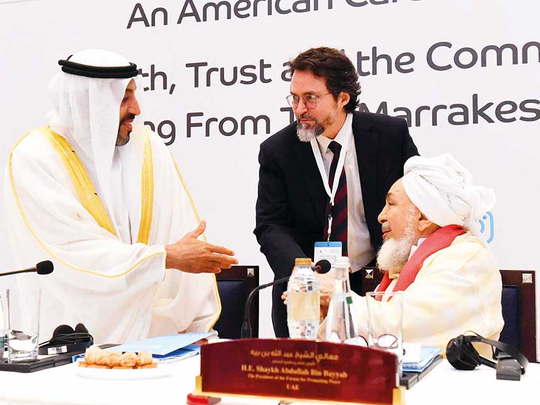
Abu Dhabi: Religious leaders representing Islam, Christianity, and Judaism met in Abu Dhabi on Tuesday representing a united front with the goal of promoting an environment of dialogue and understanding.
Coming as part of ‘An American Caravan for Peace’, several imams, pastors and rabbis from the US were welcomed by the Forum for Promoting Peace in Muslim Societies. The event highlighted the important need for holding such gatherings in the face of rising extremism and violence being carried out under the name of religion.
“We encourage this unprecedented initiative to organise this caravan of peace, which includes religious leaders from the US, and from the largest Ebrahimic family. This initiative represents hope at this time, reinforces the opportunity for coexistence and to know one another better,” said Shaikh Abdullah Bin Bayyah, president of the Forum for Peace.
“Those who exploit religion to call for violence use it as an instrument of belligerence, a source for hate, and a force of destruction. Instead, we know that religion, in essence, is a positive force in people’s lives and is a force of peace that enlivens our spirits and not one that annihilates them,” he added.
Dr Mohammad Mattar Al Kaabi, Chairman of the General Authority of Islamic Affairs and Endowments, called the gathering of faith leaders an important step in confronting the challenges being presented by religious extremism.
“This remarkable meeting comes at the right time and place… It comes at a time when the world is facing tremendous challenges and conflicts, not to mention its suffering from extremism and hatred, and terrorism and sectarianism.
“[This] matter motivated the followers of the Ebrahimic religions to join forces here to extend the culture of peace and love among the peoples and to strengthen the common value of faith and humanity,” he added.
Al Kaabi also said that the UAE was a natural host for such a gathering as the country was a model for religious cohesion and tolerance.
“This meeting comes at the right place as well, for being convened in the UAE, that was founded by our late father Shaikh Zayed Bin Sultan Al Nahyan on the values of love, moderation, tolerance and coexistence.
“There are more than 200 different nationalities from various backgrounds coexisting on the UAE lands, they are different in races and religious faiths, yet they actively join their efforts to achieve the common goals of building the nation and serving the community,” he added.
Pastor Bobby Gene Roberts Jr, founding and senior pastor of Northwood Church, acknowledged that there was a negative perception about Muslims in America, which made it important to create avenues of dialogue.
“I am an evangelical pastor, now you have heard in the last [American] election that evangelicals overwhelmingly supported President Trump… It’s kind of a strange time in our country right now, so we’re concerned about our country, we’re concerned about the rhetoric of hate,” he said.
“If we don’t do something in order to build bridges with Muslims we’ve got a real problem,” he added.
Pastor Roberts Jr said that creating religious cohesion was a necessity due to globalisation and migration, citing his own city of Dallas as an example.
“The world is changing, migration is taking place all over the world, the idea of one religion in one place is no longer realistic. There are Muslims all over my city now. In 1973 we had one mosque, today we have close to 100 mosques.”
Rabbi Bruce Lustig, senior rabbi at Washington Hebrew Congregation, the largest synagogue in Washington DC, said it was important for faith leaders to speak out against bigotry in the name of religion, and called for a healing of religious divisions.
“We have free will, we are not helpless victims of fear or bigotry, but rather masters of our own destiny. We can choose how we see others, we can choose we how we treat others, we can stand up when the sacred is violated, [and] when fear or faith is used to teach hatred.
“Let this gathering be our promise that we the children of Ebrahim choose love over hate, [and] peace over violence,” he added.








